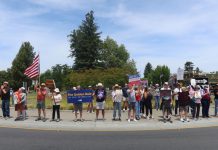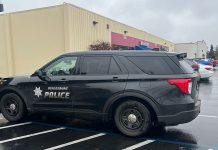
By the end of the year, or early next, every car, truck or motorcycle entering Healdsburg will have its license plate and other vehicle-specific information photographed and stored for up to a year. The plate is read by a sophisticated optical-digital Automated License Plate Reader, which then checks that information against an active “hot list” of vehicles suspected of crimes, from vehicle thefts to terrorism.
If there’s a hit, the Healdsburg Police will know.
“Yes, the system will automatically compare the license plate to plates on a hot list (stolen vehicles, amber alerts, etc.) and immediately notify dispatch and officers in the field,” said Police Chief Matt Jenkins about the Automated License Plate Reader (ALPR) technology.
Ten cameras fixed at five ingress/egress locations will be only part of the city’s ALPR system, which the Healdsburg City Council green-lighted at its Aug. 15 meeting. Parking enforcement vehicles too will continue to use ALPR cameras to track how long a tourist or a local has been docked in a time-limited spot.
The proposed initiative has been on the civic docket since Jenkins requested funding for the program in February; he formally proposed the system to the council in May and successfully lobbied to get it included in the 2022-23 city budget.
The technology has generated controversy elsewhere. Last year, Marin County Sheriff Robert Doyle was sued for illegally providing motorists’ license plate and vehicle location information to out-of-state and federal agencies, including U.S. Immigration and Customs Enforcement. The sheriff entered into a settlement agreement with the ACLU and local privacy activists in May.
Part of the council’s approval was contingent on public outreach, but a community meeting called in July to discuss the ALRP proposal met with a disappointing response, as Jenkins’ presentation to the council noted. “The Facebook post announcing the meeting reached 7,395 people and had 555 engagements. Three members of the community attended the meeting, and one member continued to engage with Police Department staff regarding the draft policy.”
Nonetheless, and with input from the council itself, Jenkins revised the draft ALPR policy he had first presented to address privacy issues, adding a second step of confirmation of a license ID and including protection against use for immigration enforcement (e.g., by ICE or any other agency “conducting an investigation for purposes of immigration”).
The proposal is now prefaced, “The policy of the Healdsburg Police Department is to utilize ALPR technology to capture and store digital license plate data and images while recognizing the established privacy rights of the public. All data and images gathered by the ALPR are for the public official use of this department. Because such data may contain confidential information, it is not open to review.”
Five intersections
Here’s how it works: The small cameras, mounted either on a police vehicle in the case of parking enforcement or at selected intersections for more comprehensive vehicle identification, capture a steady stream of images of vehicles, focusing on the area of the rear license plate. The license plate number is read, along with information of vehicle type, color and characteristics such as the presence of a roof rack or bumper stickers.
The system is connected to a regional information network such as the National Crime Information Center (NCIC) to see if a license plate produces a “hit” with the law enforcement database, as well as to alerts pushed out by neighboring agencies.
Jenkins listed several reasons a license plate would be in a law enforcement database, including being reported as a stolen car, associated with a wanted or missing person, related to a domestic violation protective order or even to terrorist-related activity.
The police department has identified five intersections where two fixed ALPR cameras each can be installed to best capture the traffic entering the city: Healdsburg Avenue and Old Redwood Highway (south city limits); Healdsburg Avenue at Exchange Avenue; Westside Road at U.S. 101; Dry Creek Road at U.S. 101; and North Healdsburg Avenue at Passalacqua Road (north city limits).
The images and information from fixed ALPR cameras would be retained for 90 days, then purged. A parallel ALPR program would capture plate imagery from a drive-by parking enforcement vehicle, as a potential source of parking tickets for scofflaws. Those records would be kept for a year, to allow plenty of time for cited drivers to ask for proof of their violation if they challenge the ticket.
Privacy concerns
The fact that such information is being gathered and retained at all has caused some alarm in civil liberties circles, and in 2013 the American Civil Liberties Union published a white paper, “You Are Being Tracked: How license plate readers are being used to record Americans’ movements.”
“Because they snap pictures of every passing vehicle, they generate millions of data points on the movements of individuals whom no one suspects of violating any law,” the ACLU noted.
Complicating the collection of the data itself was the retention and sharing of the collected data. While there were a handful of jurisdictions where millions of records were held indefinitely, most had retention caps ranging from 30 days to a year.
“All the pieces are lining up for widespread sharing of license plate reader data,” the ACLU warned in the 2013 report. “Law enforcement agencies must not store data about innocent people for any lengthy period. Unless plate data has been flagged, retention periods should be measured in days or weeks, not months, and certainly not years.”
Another concern was the sharing of collected ASLR information between agencies, or its accumulation into larger regional databases, in which case the local agency (the Healdsburg Police Department and City) loses control over how the data is used, stored or shared.
In a follow-up report just published in March, “Fast-Growing Company Flock is Building a New AI-Driven Mass-Surveillance System,” ACLU senior policy analyst Jay Stanley turned his attention to one company in particular. “A new and rapidly growing surveillance company called Flock Safety is building a form of mass surveillance unlike any seen before in American life.”
According to flocksafety.com, their “patented Vehicle FingerprintTM technology lets you search by vehicle make, color, type, license plate, state of the license plate, missing plate, covered plate, paper plate and unique vehicle details like roof racks, bumper stickers and more.”
Flock Safety touts their cameras with the tagline, “See like a detective,” but the ACLU is less enamored of the comparison, characterizing the company as having “a business model that effectively enlists its customers into a giant centralized government surveillance network…”
Following Jenkins’ presentation, public comment and council members’ cautions, the council appended some conditions to the motion, including increasing the time the fixed camera system would retain the information from 30 days to 90, and urging that signage be posted telling drivers the system is in place. They voted to approve the program by a 4-0 vote.
Implementation
The proposed ASLR project in Healdsburg would include the training of personnel in the use of the system and the appointment of an “administrator” by the police chief—in addition to the cost of leasing and operation of the cameras themselves, which would be under the operation of the selected contractor.
According to the city’s new ASLR policy, it is the contractor who would be responsible for the storage of the information and database and purge the information after the time period specified by the city—90 days for the fixed ALPR system and one year for the parking enforcement system.
That contractor is likely to be Flock Safety. Though the police chief solicited quotes from three companies, only two responded. “Flock is the lower of the two and provides the services and quality of product we are looking for,” Jenkins said.
“With Council’s direction, we are set to move forward with the project,” he told the Tribune following last week’s meeting. He said they are still working on details and quotes with Flock Safety to provide the city’s fixed ASPR platform.
“Once a signed agreement is in place, the installation would get scheduled with the vendor, and that timeline is still up in the air. Realistically, we are looking at 4-6 months before the cameras would be installed and functioning.”








